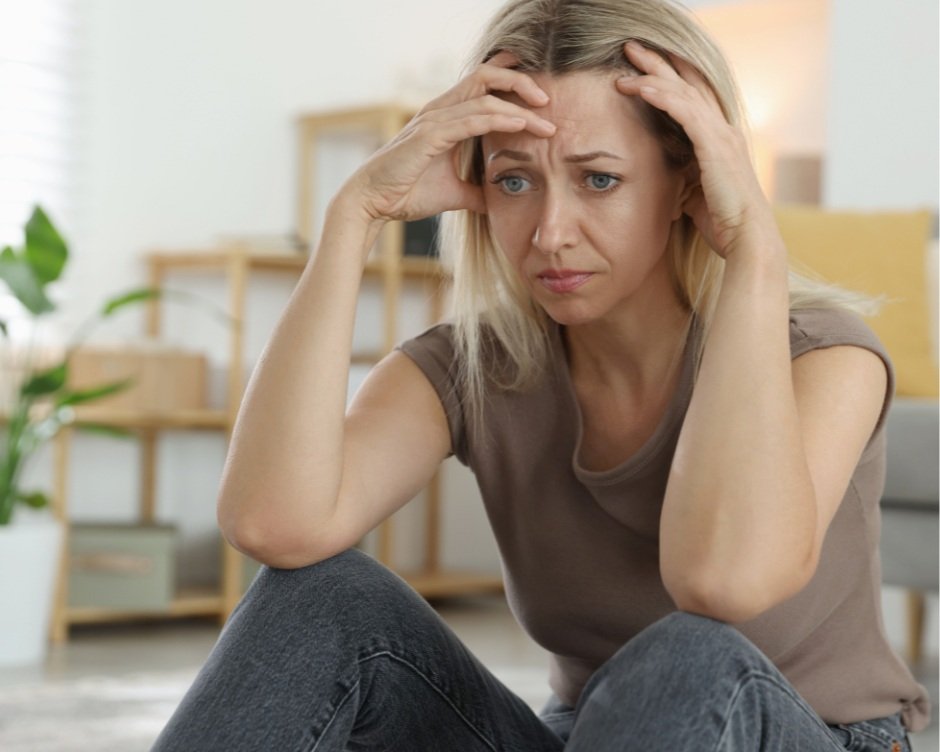How to Stop Perimenopausal and Menopausal Hair Loss
Contents
You’re juggling work, family, and the relentless demands of everyday life, but lately, you’ve noticed something else adding to your stress: more and more hair left in your brush, on your pillow, or clogging the shower drain. And when you’ve turned to Google for answers, you’ve likely found everything from miracle shampoos to expensive supplements… but very few clear explanations.
So, does hair loss from perimenopause or menopause grow back? Can anything actually help slow it down, or better yet, reverse it?
In this blog, I’ll break down exactly why hair starts thinning during this stage of life, explain the underlying causes that most people overlook, and help you understand which changes really work and which are just expensive distractions.
Does perimenopause hair grow back?
Hair thinning during perimenopause can feel relentless, especially when it’s happening fast and you’re already stretched thin emotionally, physically, and mentally. If you’re noticing more hair in your brush or watching your parting widen, you’re not imagining it and yes, it’s incredibly distressing.
But the good news is that in many cases, regrowth can happen, with the right support.
The chances of regaining fullness depend on a few key things:
What’s causing the hair loss: Hormonal changes are often a big factor during perimenopause, but they’re rarely the only one. Iron deficiency, low vitamin B12, stress, disrupted sleep, and even dietary changes can all play a role.
How long it’s been happening: The earlier you seek help, the more options are usually available. Left unaddressed, some types of hair loss can become more difficult to treat, not impossible, but slower to respond.
What else is going on: It’s very common for menopausal hair loss to occur alongside other health changes — like fatigue, anxiety, gut issues, or skin flare-ups. All of these can affect hair health, directly or indirectly.
In my clinic, I look at the bigger picture. That includes your symptoms, your lifestyle, and where needed, blood tests to uncover hidden deficiencies or imbalances. Often, hair loss is a sign that something deeper is going on.
With the right treatment plan, tailored to your needs many women see stronger, healthier hair over time. But it’s not just about hair. It’s about helping you feel like yourself again.
How to Stop Thinning Hair in Perimenopause
When your hair starts thinning during perimenopause, it can feel like you’re losing a part of yourself. But the good news is, there are steps you can take to slow it down and, in many cases, support healthy regrowth.
For some women, hormone replacement therapy (HRT) plays a valuable role, particularly body-identical oestrogen and progesterone, prescribed by a menopause specialist who understands the full picture. HRT can help reduce excessive shedding caused by declining oestrogen levels, but it’s not the whole story.
If you have a genetic tendency towards pattern hair loss (such as a family history of thinning), certain types of HRT — especially those that include testosterone can sometimes make the problem worse. That’s why individual assessment is so important before starting treatment.
Beyond hormones, it’s vital to look at your daily routines. Many women going through perimenopause aren’t getting enough protein, skip meals, or rely on caffeine and sugar to get through the day, all of which can quietly undermine hair health. Low iron, stress, poor sleep, and not drinking enough water can also send your hair follicles into a prolonged shedding phase.
Stopping hair loss during perimenopause often means making small, consistent changes across several areas, from nutrition and stress to hormones and hydration. It’s rarely just one thing, and when you start supporting the body as a whole, the hair often begins to follow.
What vitamins are good for perimenopausal hair loss?
If you’ve been scouring the internet for the best supplements for thinning hair, you’re not alone. But here’s the truth: no single vitamin will magically stop perimenopausal hair loss, and in many cases, supplements aren’t needed at all.
The supplement industry is worth billions, and unfortunately, it often preys on vulnerable people with promises that rarely deliver. In clinic, I regularly meet women who have spent hundreds on hair gummies or multivitamins with little to no change, simply because they weren’t lacking in the nutrients those products contain.
That’s why I always recommend getting blood tests before starting any supplement. If your body already has enough of something, adding more won’t help, and in some cases, it can actually make things worse. Too much zinc, for instance, can interfere with copper and trigger more shedding. Vitamin A in excess can dry the scalp and disrupt the hair cycle. Even so-called “harmless” supplements can put extra pressure on your liver and kidneys over time.
The good news? If your blood work does highlight a deficiency, nutritional support can play a key role in improving hair health. Common deficiencies I see during perimenopause include:
| Nutrient | Why it matters for hair | Good food sources |
|---|---|---|
| Vitamin B12 | Red-blood-cell production and oxygen delivery to the scalp | Eggs, beef, fortified nutritional yeast |
| Iron (ferritin) | Supports oxygen flow and hair-follicle activity | Lentils, spinach, red meat |
| Zinc | Repair, tissue growth, balanced sebum production | Pumpkin seeds, chickpeas, wholegrains |
| Vitamin D | Supports immune balance and inflammation control | Salmon, mushrooms, fortified plant milks |
If you’re not getting enough of these from your diet, or your body isn’t absorbing them well, targeted supplementation might be useful, but only with proper guidance.
I always prioritise food first. Building meals that support hormone balance and energy levels can make a huge difference, not just to your hair, but to your overall sense of wellbeing. Especially during perimenopause, when everything feels like it’s shifting, small consistent changes to how you nourish your body can bring back a sense of control.
Why has my GP said nothing can be done about my hair loss?
If your GP has told you that nothing can be done about your hair loss, you’re not alone, and you’re certainly not imagining things. This is one of the most common frustrations I hear from women who come to my clinic feeling dismissed, confused, and genuinely heartbroken.
Hair loss isn’t “just cosmetic.” It’s deeply emotional. It can affect your confidence, your sense of self, and your daily life. Yet too often, women are told it’s “normal for your age” or that they should simply accept it, especially around perimenopause or after childbirth.
Here’s the truth: Most GPs don’t receive detailed training in hair and scalp conditions. And while they do an excellent job of looking after general health, they simply aren’t specialists in hair loss. In many cases, they’re unaware of newer, non-surgical options or don’t have time to dig into the full picture, especially if you appear otherwise healthy.
They may run a basic blood test (often missing key markers like ferritin, B12, or thyroid antibodies), and if those come back “within range,” they may stop there. But “normal” on paper doesn’t always mean optimal, especially when it comes to hair.
If your concerns have been dismissed or minimised, it can feel incredibly isolating. You might even start to doubt yourself. But please know: you are not overreacting. You deserve answers, and you deserve a treatment plan that looks at the whole you, not just your scalp in isolation.
Whether your hair loss is linked to hormones, stress, nutritional deficiencies, inflammation, or something else entirely, there is nearly always something that can be done. You just need the right eyes on the problem, and a space where you feel truly heard.
Feeling overwhelmed by hair changes?
Hair loss during perimenopause and menopause isn’t just physical — it can chip away at your confidence, your sense of identity, and your energy when you already feel like you’re running on empty. And when you’re told by a GP that it’s “just hormones” or “part of ageing,” it can leave you feeling helpless and unheard.
But there is a way forward.
If you’re worried about your hair and you’re not sure where to turn, I offer in-depth consultations designed to uncover the real reasons behind your shedding — whether hormonal, nutritional, lifestyle-related, or a combination of all three. Together, we’ll create a plan that works for your life, your routine, and your goals.
You don’t have to keep guessing. And you’re not imagining it.
This is real — and support is here when you’re ready.








